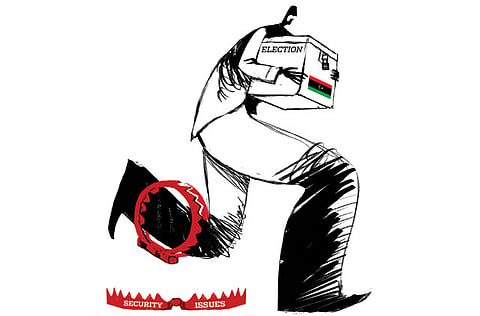Libya needs more than elections
Security situation has deteriorated rapidly

The escalation of terror attacks and violence in Libya can be halted if the militia forces are brought within a new regulated framework. The past month has been a tumultuous one for Libya. Successful local elections in Benghazi, in which voter turnout was impressive and a female candidate secured the largest number of votes, showed that the country can move towards becoming a state with viable democratic processes and representative leaders. Yet, with every step it takes forward, Libya takes another two back. The security situation has deteriorated rapidly over the past two weeks. Last week, it was the turn of the International Committee of the Red Cross in Misrata to come under attack. The same week, the British ambassador’s convoy in Benghazi was hit, with two bodyguards injured in the ensuing gun battle. Before that there was an attack on the US diplomatic mission in the same city.
Apart from terror attacks such as these, Libyans are fighting each other. Militiamen act with impunity, as the recent seizure of Tripoli airport showed, while clashes continue in the southern town of Kufra, where pro-government militiamen are locked in an armed conflict with tribal forces over smuggling routes. The clashes have so far claimed at least 20 lives.
Civil war and increased bloody lawlessness in Libya is now a real possibility, with all indicators suggesting that the worst may be yet to come.
Militias continue to constitute the primary force in Libya, militarily and politically. They represent regions, tribes and powerful families, though some are simply criminal. Most act independently of the interim government, the National Transitional Council (NTC), especially the most powerful ones such as those from Misrata in the east and Zintan in the west, which are now essentially states within a state.
Although Libya has a more homogenous population than Iraq and Lebanon and is therefore unlikely to suffer civil war on the same scale as in either of those countries, the future does not bode well because of two principal reasons.
First, national security lacks co-ordination and organisation, with the result that conflict between rival groups and criminal activities like smuggling and terrorism flourish in the gaps.
Second, the stakes are likely to be higher after the coming elections. Many Libyans argue that elections offer the best hope of stability in the form of a more assertive state, a view also shared by journalist Lindsey Hilsum.
However, the situation could become more volatile after the elections as the various factions contest one another for control of the country, its riches and the army, not least since rival militia forces will be contesting the elections directly or will have extensive links to the political leaders that emerge. Militia forces will, therefore, fear the personalisation of state institutions by rivals and look to assert their control over the most powerful of ministries and institutions.
Thus, infrequent and localised struggles could turn into conflicts for survival and superiority. However, rather than pinning too much hope on the elections there are several steps that could be taken to stabilise the country today and protect the population against protracted conflicts in the future.
Some argue that the best way to give the state increased control is to reinforce the army, currently controlled by the NTC, and equip it with more sophisticated weaponry. But that could escalate the problem by forcing the militias to amalgamate into coalitions in order to preserve their superiority. They will not back down in the face of an emboldened NTC army and will look for support from outside forces.
An alternative approach would be to accept that the most powerful militia forces will remain the primary force on the ground, at least in the medium term, and that the NTC, unpopular and illegitimate in the eyes of the militias, is unlikely to be able to form an effective army independently. The most powerful of militias could, therefore, be integrated to form (and preside over) a centralised national army that combines with a power-sharing mechanism, stopping any one group from consolidating too much power.
Finally, the existing regionalised security environment can be reworked so that while militia forces are kept intact, and in some cases even strengthened, their military role will be sustained as part of a regulated framework underpinned by dispute-resolution mechanisms and one that makes them more organised, efficient and accountable to protect their region and national borders.
This will allow the militias to properly and legitimately maintain their status as law enforcers in the disparate regions they control, while also allowing a centralised state force to emerge.
The so-called national army, operating out of Tripoli, will, in this scenario, simply co-operate with regional forces on matters of intelligence and military operations, while also intervening in local disputes as and when needed and acting as a mediator in a manner akin to the mobile forces that existed in the 1950s and 1960s under Libya’s former ruler, King Idris.



